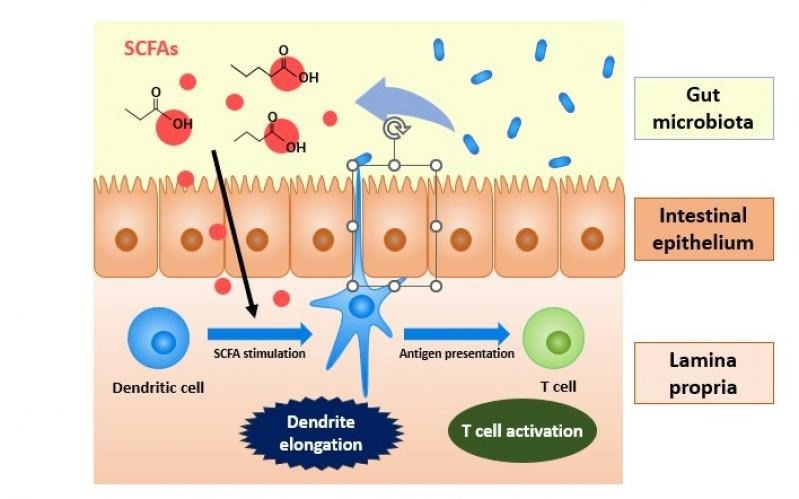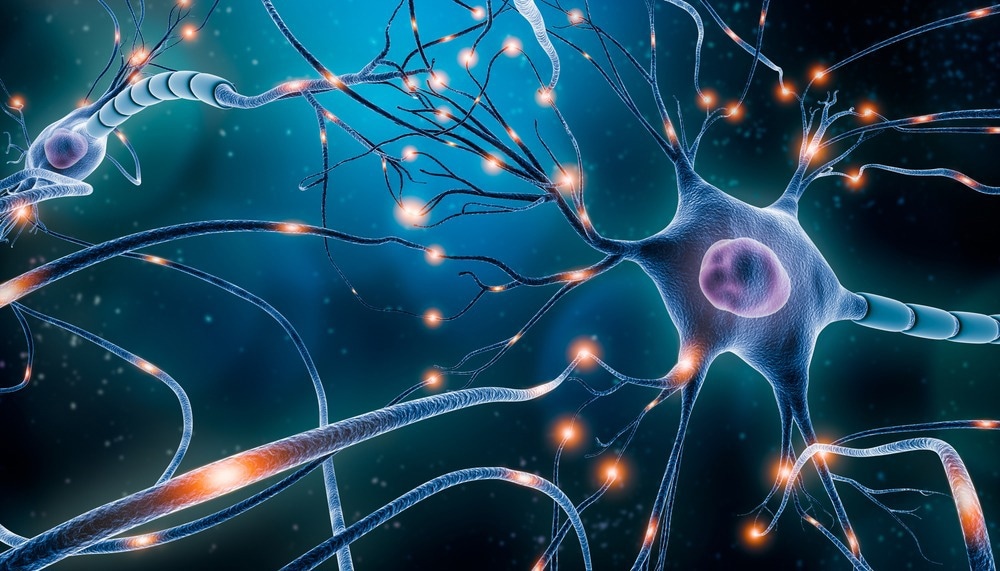Reviewed by Danielle Ellis, B.Sc.Oct 31 2023
Dendritic cells play a pivotal role within the mammalian immune system, being distributed throughout the human body. They are recognized for their ability to apprehend foreign agents, or antigens, using their extendable “arms” known as dendrites.
 Short-chain fatty acids trigger extension of dendrites. Image Credit: Okayama University.
Short-chain fatty acids trigger extension of dendrites. Image Credit: Okayama University.
Once these antigens are captured, dendritic cells then proceed to present them to immune T cells, thereby triggering an immune response. Remarkably, dendritic cells are highly adaptable to their surroundings and can dynamically alter their morphology and other attributes.
To illustrate, within the intestinal mucosa (the inner layer of the intestine), dendritic cells employ their dendrites to reach through the epithelium (the outermost layer) and into the intestinal lumen (the inner space) to capture harmful bacteria. However, the precise mechanism by which they achieve this remains unclear.
A study published in The FEBS Journal on August 30, 2023, by a research team led by Associate Professor Kazuyuki Furuta, along with Mr Takuho Inamoto, Dr Kazuya Ishikawa, and Dr. Chikara Kaito from Okayama University’s Graduate School of Medicine, Dentistry, and Pharmaceutical Sciences in Japan, has unveiled the role of short-chain fatty acids (SCFAs), produced by intestinal bacteria, in initiating the extension of dendrites into the intestinal lumen by dendritic cells.
SCFAs, a category of fatty acids containing six or fewer carbon atoms, are notably abundant in the intestinal environment. The study demonstrated that SCFAs like acetic, propionic, butyric, and valeric acids trigger the elongation of dendrites by inhibiting the enzyme histone deacetylase.

Image Credit: MattL_Images/Shutterstock.com
The inhibition of histone deacetylase prompts a restructuring of the actin cytoskeleton in dendritic cells, leading to significant morphological changes.
To arrive at these conclusions, the research team conducted experiments examining the impact of SCFAs on dendritic cells using a dendritic cell line (DC2.4 cells) and mouse bone marrow-derived dendritic cells (BMDCs) in a laboratory setting.
Ours is the first study to demonstrate that SCFAs induce dendrite elongation by inhibiting histone deacetylase. Moreover, dendritic cells activated by SCFAs exhibited more stronger immune responses, due to increased pathogen uptake.”
Kazuyuki Furuta, Associate Professor, Okayama University
After performing additional investigations, the research team discovered that when dendritic cells were exposed to valeric acid, there was a notable rise in the absorption of soluble proteins, insoluble beads, and Staphylococcus aureus bacteria. Conversely, the administration of valeric acid to BMDCs improved their capacity for presenting antigens.
Furthermore, it was observed that SCFAs induced the elongation of dendrites by activating a signaling pathway associated with the rearrangement of the actin cytoskeleton, which plays a pivotal role in both cell movement and cellular morphology.
So, what are the effects of these findings?
Our findings may be leveraged to identify beneficial intestinal bacteria producing SCFAs to activate immune responses and aid in the prevention of diseases. In addition, the dendritic elongation mechanism we discovered can be used as a target to develop drugs regulate immune responses artificially.”
Kazuyuki Furuta, Associate Professor, Okayama University
This study, by elucidating the precise mechanism through which SCFAs induce dendritic elongation, has opened the door to the development of novel drugs designed to directly impact dendritic cells. There is an eager anticipation for the emergence of these innovative treatments.
Source:
Journal reference:
Inamoto, T., et al. (2023) Short-chain fatty acids stimulate dendrite elongation in dendritic cells by inhibiting histone deacetylase. The FEBS Journal. doi.org/10.1111/febs.16945